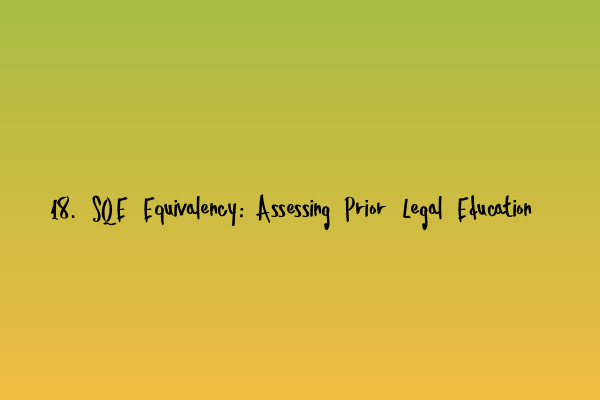18. SQE Equivalency: Assessing Prior Legal Education
Welcome to SQE Exam Law, your ultimate resource for all things related to the Solicitors Qualifying Examination (SQE). In this blog post, we will be exploring the concept of SQE equivalency and how prior legal education can be assessed in the context of the SQE. Whether you have completed a law degree or have relevant legal experience, understanding how your prior education is evaluated can be crucial in your journey towards becoming a qualified solicitor.
Assessing Prior Legal Education
One of the key features of the SQE is its focus on assessing candidates’ competence rather than relying solely on the traditional route of completing a law degree and the Legal Practice Course (LPC). This means that individuals with a range of educational backgrounds can now pursue a career in law.
The Solicitors Regulation Authority (SRA) has established a framework for assessing prior legal education, which allows candidates to demonstrate their competence and knowledge in a variety of ways. This includes assessing both academic qualifications and practical experience.
Academic Qualifications
If you have completed a law degree or an equivalent qualification, you may be eligible for SQE equivalency. The SRA has provided guidelines on the criteria for assessing whether a qualification is equivalent to a law degree. These guidelines take into account the content, level, and method of assessment of the qualification.
It is important to note that the assessment of equivalency is not based purely on the name of the qualification or the institution where it was obtained. Instead, it focuses on the substance of the qualification and whether it provides the necessary foundation for a career in law.
In the assessment process, the SRA will consider factors such as the core subjects covered by the qualification, the depth of legal knowledge gained, and the practical skills developed. They may also take into account additional qualifications or certifications obtained by the candidate.
If your qualification is assessed as equivalent to a law degree, you may be exempted from certain elements of the SQE, allowing you to progress directly to the second stage of the examination.
Practical Experience
The SQE also recognizes the value of practical experience in the legal profession. If you have relevant legal experience, you may be eligible for SQE equivalency based on the SRA’s guidelines.
The SRA recognizes that practical experience can provide candidates with the necessary skills and competencies required to practice law effectively. This includes experience gained through work placements, internships, training contracts, or even volunteering in a legal setting.
The assessment of practical experience takes into account factors such as the length and nature of the experience, the level of responsibility undertaken, and the level of supervision received. The SRA may also consider the quality of the experience and its relevance to the skills and competencies tested in the SQE.
If your practical experience is assessed as meeting the criteria for SQE equivalency, you may be exempted from certain elements of the examination, allowing you to focus on the areas where you require further development.
Benefits of SQE Equivalency
Obtaining SQE equivalency can offer several benefits to candidates. Firstly, it provides an alternative route to qualification, allowing individuals with diverse educational backgrounds to enter the legal profession.
Secondly, SQE equivalency recognizes the value of practical experience, which may not be traditionally considered in the context of a law degree. This provides an opportunity for those with relevant experience to showcase their skills and competencies without having to go through the entire educational pathway.
Furthermore, SQE equivalency can save candidates both time and money. By exempting candidates from certain elements of the examination, it reduces the overall cost and duration of the qualification process. This is particularly beneficial for those who have already invested time and resources in their legal education or practical experience.
Preparing for the SQE
If you are seeking SQE equivalency, it is essential to familiarize yourself with the guidelines provided by the SRA. These guidelines outline the criteria for assessing both academic qualifications and practical experience.
Additionally, it is highly recommended to develop a comprehensive study plan and strategy to tackle the examination. Our related articles can help you in this regard:
- SQE Strategies: Proven Tactics to Ace the Solicitors Qualifying Examination
- SQE Case Studies: Applying Knowledge in Real-Life Scenarios
- SQE Exam Strategy: Planning and Executing for Optimal Performance
- Solicitors Qualifying Examination (SQE): Your Gateway to Legal Practice
- Mastering Time Management in SQE: Strategies for Efficient Exam Completion
These articles provide valuable insights, strategies, and tips to help you prepare for the SQE examination effectively. They cover important topics such as study techniques, exam strategies, case studies, and time management.
In conclusion, SQE equivalency provides an opportunity for individuals with prior legal education to demonstrate their competence and knowledge in the context of the Solicitors Qualifying Examination. Whether you have completed a law degree or have relevant legal experience, understanding the assessment process and preparing effectively is crucial for a successful outcome.
We hope that this blog post has provided you with a comprehensive overview of SQE equivalency and its assessment of prior legal education. If you have any further questions or require more information, please do not hesitate to contact us at SQE Exam Law. Good luck with your SQE journey!
